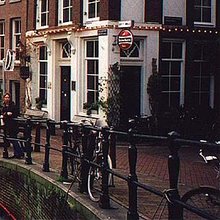Anam Cara (Irish Gaelic for 'Soul Friend') is a beautiful and profound work of reflection and poetic prose, by the late
John O'Donohue, priest and philosopher. It is a truly great book - one of those rare books whose greatness you sense on reading only a few lines or pages.

the book - rather a small image !
I've discovered this work late. Published in 1997, I actually bought it several years ago, and struggled to make sense of it, because I couldn't place O'Donohue's worldview and frame of reference. Was he coming at the subject from a Christian, or a pagan, or a secular point of view ? Well, I picked the book up again a few weeks ago, and this time it all made sense (which possibly shows I've moved on in the interim.)

John O' Donohue
O'Donohue is painting a picture of human personhood, or being a human: how each person contains a great well of creativity, being and expression; how each person relates to the world and nature; and how we connect with the world in friendship, work and living. He spent many years studying this topic in academic circles, but also no doubt in his daily life as a priest.
The vision set out is that of the Celtic world, embraced by both pagan and Christian, with its sense of the sacredness and timelessness of everything and of the profundity and natural beauty in all things. He contrasts the shallow modern obsession with 'relationships' with the Celtic appreciation that true friendship was like a circle which is mysteriously completed when two people recognise each other, and it is best not analysed.
 Celtic landscape
Celtic landscapeThe quality of the writing is stunning: lines of prose read like poetry in their quiet sensitivity and colour of expression:
'The world rests in the night. Trees, mountains, fields and faces are released from the prison of shape and the burden of exposure. Each thing creeps back into its own nature within the shelter of the dark.' (p 22)
'Love is also a force of light and nurture that liberates you to inhabit to the full your own difference. There should be no limitation of each other; no need to be defensive or protective in each other's presence. Love should encourage and free you fully into your full potential'. (p 53)

Anam Cara stone
Likewise, the insights into all manner of aspects of human experience are breathtaking in their depth.'Once the soul awakes, the search begins and you can never go back.' (p 28)
'A friend is different from an acquaintance. A friendship is a deeper and more sacred connection .... A friend is a loved one who awakens your life in order to free the wild possibilities within you.' (p 41)
'Your face is the icon of your life. In the human face a life looks out at the world and also looks in on itself .... The face always reveals who you are, and what life has done to you.' (p 68)
'People are often exceptionally careless in their style of belonging. Too many people belong too naively to the systems in which they are involved.... The heart of the matter is, you should never belong fully to something that is outside yourself .... You should belong first in your own interiority. If you belong there, and if you are in rhythm with yourself and connected to that deep unique source within, then you will never be vulnerable when your outside being is qualified, relativized or taken away.' (pps 181-2)
'Anam Cara' is wonderful spiritual food for anyone reflecting on what it means to be human, a magical and mystical blend of poetry, philosophy and observation. Highly recommended.

an Anam Cara plaque
Reading: 'Anam Cara: Spiritual Wisdom from the Celtic World' by John O'Donohue, 1997.

 (scene from Elvis' early '70s concerts, with Elvis in trademark tailor-made white jumpsuits: although his 70s stage-costumes are sometimes regarded as over-the-top, Elvis made some of his best music about this time)
(scene from Elvis' early '70s concerts, with Elvis in trademark tailor-made white jumpsuits: although his 70s stage-costumes are sometimes regarded as over-the-top, Elvis made some of his best music about this time)







